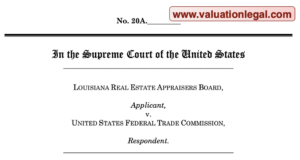Update: On December 18, 2020, the Supreme Court denied LREAB’s request for a stay of the FTC’s action underlying the potential appeal — this means that, even while LREAB pursues a potential appeal to the Supreme Court, the FTC case will go forward.
The first case about real estate appraisers to reach the U.S. Supreme Court in almost 60 years could concern the Federal Trade Commission’s price-fixing claims against the Louisiana Real Estate Appraisers Board. Would that be a good thing for appraisers? Well, maybe it’s not the best timing.
Filed in 2017, the FTC’s administrative complaint asserts that the Louisiana appraiser board, “a state agency controlled by licensed real estate appraisers, has unreasonably restrained price competition for real estate appraisal services.” The FTC contends that the board carried out this price-fixing through its regulation of fees paid to appraisers by appraisal management companies and through its enforcement actions – while being controlled by the board’s eight appraiser members, who allegedly had private interests in higher fees.
One of the Louisiana board’s asserted defenses was something called “state-actor immunity.” Under this defense, the Louisiana board argued that the alleged anti-competitive actions of the board and its members were not illegal because they were state government-sanctioned actions and policy decisions. The FTC’s counter to the defense was that the protection did not apply because the Louisiana board was controlled by “market participants” – i.e., private appraisers with an interest in the outcome. When the FTC ruled that the appraiser board could not rely the defense, the board challenged the ruling by suing the FTC in federal court and asking the federal court to overrule the FTC. As covered in my earlier post about the complete history, the Fifth Circuit Court of Appeals recently ordered that the board’s court case be dismissed and that the FTC’s administrative proceeding go forward.
Now, in a December 9, 2020 filing, the Louisiana appraiser board has indicated that it will seek review by the U.S. Supreme Court. But first, before it files its petition for writ of certiorari, the board has asked the Supreme Court to suspend the FTC’s administrative proceeding, while its appellate effort goes forward (the Court of Appeals denied the same request). The board contends that the Supreme Court will likely accept review, writing in its application that “it is unusually clear in this case that there is ‘a reasonable probability’ that this Court will grant certiorari to review the Fifth Circuit’s decision.” (Read the full application for a stay filed by the Louisiana board here.)
If the Louisiana appraiser board’s petition for writ of certiorari succeeds, this will be first U.S. Supreme Court case specifically about real estate appraisers since 1961 (based on my research). A Supreme Court case would certainly bring heightened attention to the FTC’s underlying action and the FTC’s allegations that an appraiser-controlled professional board engaged in price-fixing for residential appraisal services. The battle may not come at the best time for appraisers. At present, appraisers are facing public, media and government attention regarding allegations that their valuations are discriminatory (whether intentionally, systemically or otherwise) by undervaluing properties owned by racial minorities or located in areas with large minority populations. The new Biden administration is expected to closely consider these issues and to look at possible overhauls. Some critics have proposed increased use of automated valuation methods (AVMs) as a solution. This is likely not the best time for appraisers to also gain further attention for the Federal Trade Commission’s contention that one of their boards has engaged in alleged price-fixing.
Regardless of whether appraisers should want the Louisiana case to gain more attention, it’s probably true that the legal issues at the core of the appeal here are important to other types of professional boards across the country who may similarly be accused of anti-competitive actions. As the attorneys for the Louisiana board state in their application: “the factual context of this case board applies to thousands of state boards across the United States whose membership is comprised of professionals who participate in the regulated industries.”

1 Comment
Louisiana Appraiser Board Seeks to Have Appraisal Fee Price-Fixing Case Heard by Supreme Court - Appraisal Buzz · January 27, 2021 at 9:41 am
[…] This article was first published on valuationlegal.com here. […]
Comments are closed.